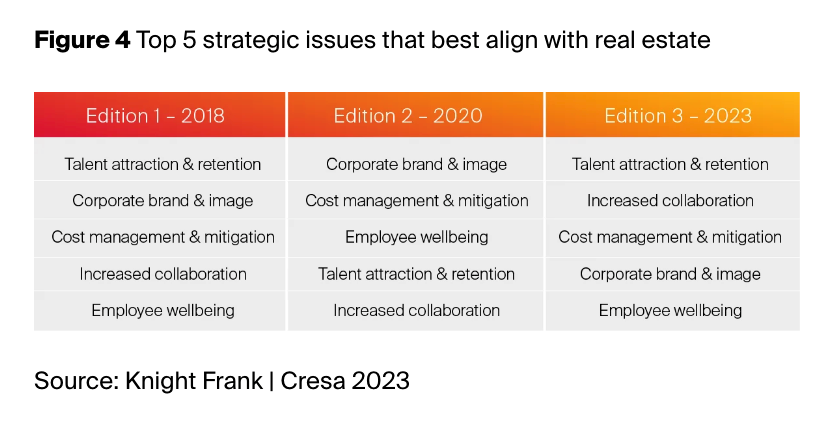'Magical hallway conversations' and the challenge of hybrid work
Making sense of the latest trends in property and economics from around the globe.
4 minutes to read
Mortgage market volatility
The Bank of England's cycle of interest rate hikes that began in late-2021 exposed vulnerabilities in the UK mortgage market.
Each time it looks clear that hikes are coming, the bank with the cheapest mortgage products on the high street gets inundated with applications and is forced to withdraw chunks of its product line. A new bank becomes the cheapest and the cycle repeats.
HSBC yesterday withdrew its entire product line at short notice, the Times reports this morning. New customers will have to wait until Monday for mortgages to become available - likely at new prices. Several lenders have made similar moves following April's CPI reading, published last month.
It's an understandable but unwelcome feature that exacerbates the effects of macro-economic stress. There are good reasons that this period of volatility may be fairly short lived, however. Swaps rates, instruments used by the lenders to price mortgages, look fairly stable, and the lenders are all doing less business than they would like to be. Competition will continue to exert pressure to hold rates lower for as long as possible, though much will depend on the next CPI reading, due out later this month.
Stable conditions
Metrics spanning new buyer enquiries, agreed sales and sentiment regarding house prices all continued to improve through May, according to the latest market survey from the Royal Institution of Chartered Surveyors (RICS).
The measure of new buyer enquiries, though still negative, was the least pessimistic for a year. Agreed sales indicator returned a net balance of -7%, noticeably less downbeat than figures of -29% and -18% seen back in March and April respectively
Issues with lack of stock that have dominated the UK property market look to be easing. New instructions delivered a net balance of +14, breaking a run of thirteen successive negative readings.
All-in-all, a positive report that underlines the degree to which the market has recovered from late 2022, but it likely doesn't take into account the latest rises in mortgage rates, which will weigh on sentiment in the next survey.
Making hybrid work
The operating environment for corporate real estate leaders is growing more complex as they continue their experiment with new working styles, our (Y)ourspace survey of almost 650 corporate real estate leaders found.
The survey confirmed that the struggle to find the right balance extends beyond the isolated cases you often read in newspapers via leaked memos from CEOs and is indeed playing out globally. Much of the focus since the onset of the pandemic has been on the tech companies, perhaps because they are building the tools that facilitate our new workstyles, but the (Y)ourspace report confirmed that challenges in delivering 'hybrid' work still prevail on a very large scale, particularly when it comes to scheduling in a manner that facilitates effective interaction and collaboration.
More came from Google this week via the Washington Post and other US media, which reported that employees will be expected to comply with the company's three-day office attendance requirement, or it'll start showing up in their performance reviews.
“We’ve heard from Googlers that those who spend at least three days a week in the office feel more connected to other Googlers, and that this effect is magnified when teammates work from the same location,” a memo to staff said. “Of course, not everyone believes in ‘magical hallway conversations,’ but there’s no question that working together in the same room makes a positive difference."
The decline of 'remote first'
In-person collaboration, and real estate's role in facilitating it, has become increasingly important to business leaders over the past editions of (Y)ourspace (see table).
There has been a groundswell of technology solutions that enable digital collaboration, and these will undoubtedly have their place in our working futures. But, as Google's messaging shows, for many companies in-person collaboration is an integral part of this future and a critical use case for the office.
That's in large part why almost one-third (31%) of occupiers we surveyed describe their future workstyles as being either 'office first' or 'office only'. In contrast, despite much trumpeting in the early days of the pandemic, just 12% of occupiers surveyed expect a future workstyle described as 'work from anywhere', 'remote first' or 'fully flexible'. The largest businesses responding to our survey - those employing more than 50,000 people globally - are least likely to adopt this stance. You can read the full report here for more.

In other news...
Philippa Goldstein on the brighter outlook for UK hotels.
Elsewhere - Momentum in UK labour market fades further in May (Reuters), housebuilder Crest Nicholson warns about impact of inflation on sector (FT), and finally, the UK economic outlook improves, according to the BCC (Bloomberg).